Nov/Dec 2010
Nov/Dec 2010 sadminAdvice
Advice sadminHealth
How safe is your child?


Children in the home
Your children can drown in a bucket of water, or in a water-logged vacant lot across your street. They can be burnt by hot water or suffer serious injury being run over walking to school. They can accidently poison themselves with a household chemical, or electrocute themselves playing with exposed electricity cables.
How safe is your child?
As adults, caregivers and parents, we must take responsibility and make sure that our children learn, play and grow up in a safe environment without the threat of being hurt. Many childhood injuries and deaths are preventable if some simple safety habits are practised.
A good place to start being safety conscious is in the home, which is the most common place where children are injured. The home can be full of hazards that can seriously injure children.
Road traffic injuries and children
One of the best protective measures to safeguard children and babies when travelling in a car is to use seat belts, child safety seats and booster seats that are appropriate for the child’s age and weight. Small children, especially those under 10, are extremely prone to head injuries as their heads are heavier in comparison with the rest of their bodies.
Safety tips for child pedestrians / cyclists
The Road Safety Foundation states that a staggering percentage of people who die on our roads are pedestrians and that road traffic injuries are the biggest cause of traumatic injuries sustained by South Africans. Let’s all do our part in protecting our child pedestrians and cyclists.
- Children are only ready to cross the road ‘safely’ at the age of eight years. Young children should not walk to school alone. If no one can walk with them, organise walking groups
- Children should be clearly visible and wear brightly coloured clothes like reflective clothing, when walking or cycling
- Helmets are compulsory for all cyclists – make sure the helmet fits correctly and is always tied securely
- Ensure that children understand the traffic rules and obey them
- Do not allow children to play on the edge of or in the middle of roads – roads are not playgrounds
- Warn children about the dangers of talking to strangers or accepting lifts from strangers
- Ensure the child knows exactly what to do in an emergency or if approached by a stranger.
Safety tips for the home
- Lock all dangerous household cleaning items, paraffin and insecticides in a secure place out of children’s sight and reach
- Lock all medicines away safely – children are attracted to colourful pills which they could mistake for sweets. Throw away unused or expired prescription medication safely – your pharmacist will be able to assist you
- Always supervise children in baths, around swimming pools and dams, and don’t leave open buckets of water where children can get to them. Drowning can occur in a few seconds
- Hot water burns like fire, so keep all hot objects, boiling kettles and pots out of reach of prying fingers
- Cook with care. Never leave food unattended on the stove and turn pot handles to the inside of the stove plates
- Do not leave children unattended around candles, open flames or fires, and make sure that matches are out of reach
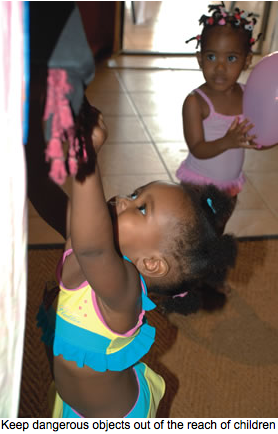
- Ensure electrical cables are safely secured and out of the way. Don’t run cables under carpets – they can be damaged by people trampling on them
- Fit electrical sockets with safety plug covers
- Lock guns and ammunition away safely, preferably in a gun safe
- Do not leave plastic bags lying around – children can suffocate themselves
- Get rid of old fridges, stoves and cars in the yard – they are perfect hiding places, BUT often the doors cannot open from the inside
- Lock the car when it is parked and keep the keys with you. Children can easily lock themselves in, or release the handbrake and set the car in motion
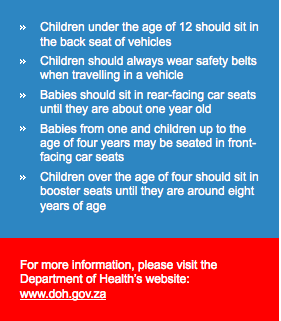
Be aware, be safe - Keep saying no to gender violence
Be aware, be safe - Keep saying no to gender violence sadmin
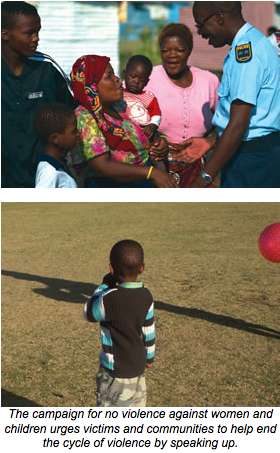
In South Africa, this year’s campaign for no violence against women and children coincides with a drop in sexual offences reported from April 2009 to March 2010.
A total of 26 311 offenders were arrested during this period. This is thanks to the strengthening of specialised police units like the Family
Violence, Child Protection and Sexual Offences units. The units have specially trained police officers throughout the country.
Report crimes
Communities can also help to end the cycle of violence by speaking up and reporting gender violence.
Studies have shown that many crimes against women and children
are committed by people who know the victims. But victims and family members are often afraid to report such crimes for fear of more abuse, some even fear for their lives.
According to the Police, failure to report such crimes is a crime in itself.
Empower
This year’s campaign focuses on victim empowerment. The aim is to enable victims to report crimes in privacy in a dignified and caring
environment.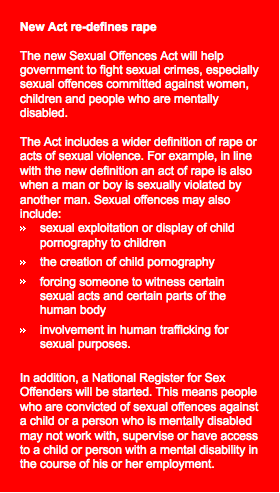
To help lessen the trauma of gender violence, Thuthuzela Care Centres have been started in all the provinces. This has improved
the process of reporting sexual offences and abuse, as well as prosecuting and convicting of perpetrators.
Shelters
In addition to Thuthuzela Care Centres, the Police in partnership with the private sector and non-governmental organisations, is working with the local Community Policing Forums to identify areas where shelters are needed for victims of abuse.
These will be safe places where victims can stay after reporting crimes instead of going back to face their abusers again.
-Mbulelo Baloyi

Be aware, be safe - Let’s support a drug free society
Be aware, be safe - Let’s support a drug free society sadmin
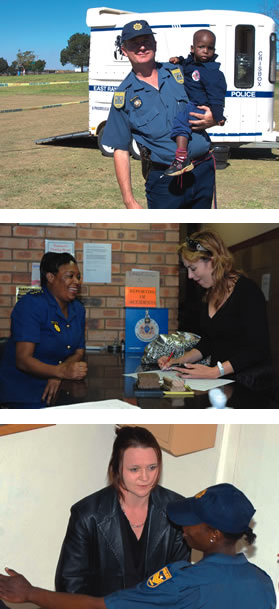
The 2nd Biennial Summit, which was held in Durban from 13 to 15 October, served as a platform to share information and ideas about the problem of substance abuse.
This included sharing ideas on how to communicate the message of zero tolerance to drug trafficking. It also highlighted the fact that substance abuse interventions are aimed at saving lives, preserving families and building stronger communities.
Schools and youth
A number of studies show that South Africa is experiencing a sharp increase in young people abusing substances like drugs and alcohol. Many of the patients admitted to rehabilitation and treatment centres for substance abuse are children as young as eight to 10 years old.
Peer pressure
Drug and alcohol abuse at a young age is often the result of peer pressure, which starts at school.
In addition, during the school holidays, children are often at home alone because their parents have to work. Children, especially
teenagers, get bored and safestart hanging around with the wrong group of people. They are then pressurised into trying new drugs, smoking or drinking alcohol, because they want to fit in.
Criminal activities
Once children start using substances, they often become addicted.
To feed their addictions they become involved in criminal activities as they try to get money to buy drugs. This can become a continuous cycle of conflict with the law.
As part of its integrated approach towards promoting a drug free society, the Biennial Summit also looked at ways to target schools and the youth.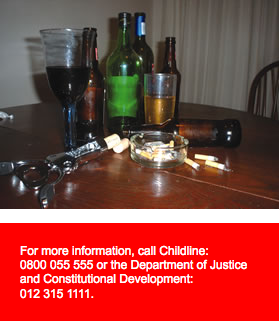
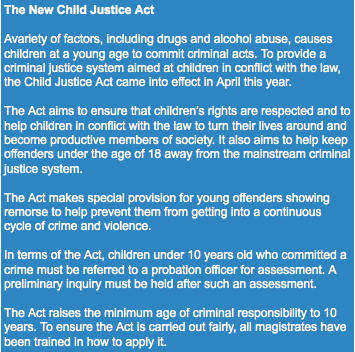
Be aware, be safe - Look out for pedestrians!
Be aware, be safe - Look out for pedestrians! sadmin
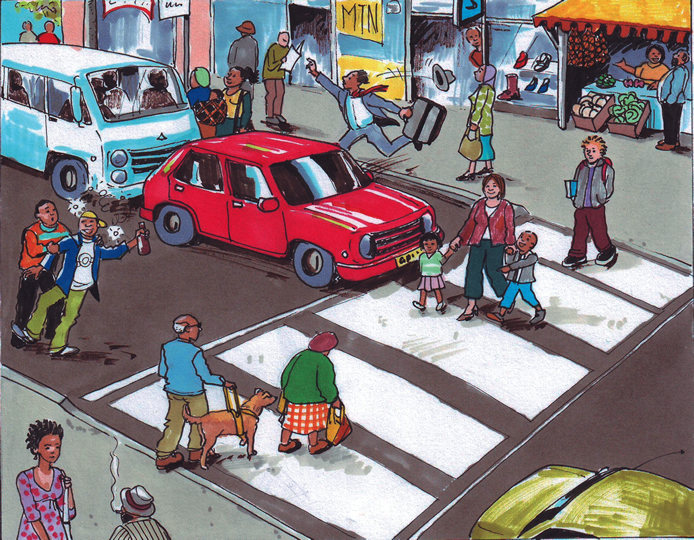
Tips for drivers
Be aware that many areas, especially informal settlements, have no formal points of crossing or pedestrian bridges. Keep in mind that you can encounter pedestrians anytime and anywhere, even in places where they are not supposed to be found.
- Do not speed near areas with no pedestrian crossings, rather slow down.
- Do not pass other vehicles near informal settlements, especially when visibility is bad.
- Do not take for granted that pedestrians
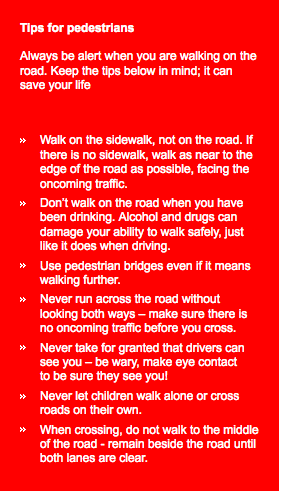
can see you. - Be on the lookout for pedestrians walking at the side of the road with their backs towards you.
- Sometimes it will be difficult to see pedestrians, especially in bad weather or at night. Keep a lookout and slow down if visibility is bad.
- Be on the lookout for small children and stray animals.
- Be especially alert around schools and places where children are active. Drive like you would expect people to drive in front of your own home or where your children are playing!
- Be careful near places where buses or taxis have stopped to drop off passengers next to the road – they may suddenly decide to cross the road!
- Slow down if visibility is bad due to conditions like heavy rain, mist, fog, darkness, the sun shining in your eyes or blinding headlights of approaching vehicles.
- Cars standing still in the street may have stopped to allow pedestrians to cross. Do not pass if there is any doubt!
-Samona Murugan
Be aware, be safe - Safety begins at home
Be aware, be safe - Safety begins at home sadmin
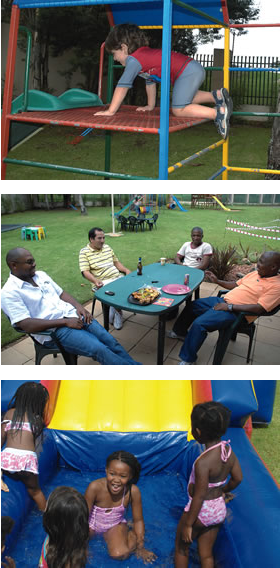
Rather be safe than sorry this festive season. Take some precautions to ensure that you and your family are safe - not only during the holidays, but throughout the year.
Safety tips
- Stand together as a community against crime and get to know your neigbours. Get together a group of people who can look out for each other and report suspicious behavior or criminal
activities. - If you go away, ask friends or neighbours you trust to keep a lookout for any suspicious people on or near your property.
- Never make use of illegal electricity connections in your home. These connections are not only dangerous, but can result in legal prosecution.
- Don’t leave small children at home alone and never let them play alone, especially near water – they can easily drown, even in shallow water.
- Teach children never to go anywhere with strangers and never let strangers into the house.
- Teach your children the police’s emergency numbers.
- Be cautious when using ATMs and think twice about drawing money in an unfamiliar or deserted area, especially at night!
-Samona Murugan
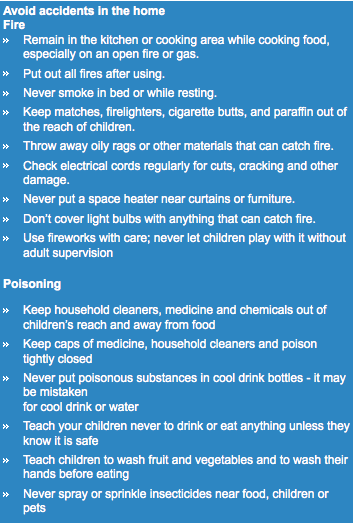
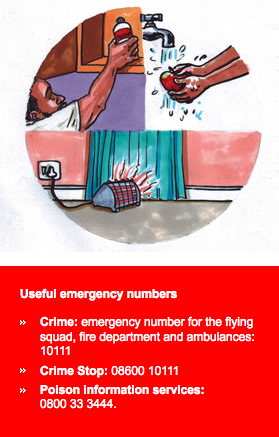
Be aware, be safe - Stepping up security for tourists
Be aware, be safe - Stepping up security for tourists sadmin
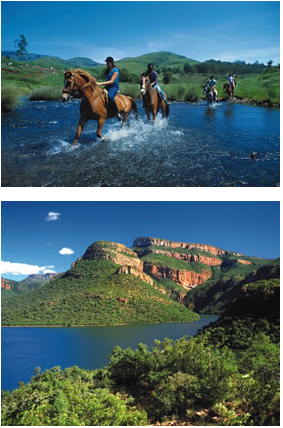
With its beautiful scenery and abundance of wildlife, Mpumalanga is one of South Africa’s favourite tourist destinations. Unfortunately, like elsewhere in South Africa, many visitors and locals are robbed or attacked during the festive season. Criminals often mislead unsuspecting tourists by posing as friendly guides.
It is therefore one of the province’s top priorities to ensure a safe and risk-free festive season for visitors, as well as locals.
Following the success of the Tourism Safety Monitors during
the 2010 FIFA World Cup, the monitors have been tasked to help make the province a safer place for visitors during the festive season.

Visible
Monitors may be identified either through reflector jackets, red t-shirts showing the logos of the Police and the Department of Community Safety, Security and Liaison or an identification tag. The monitors do not only create a safer environment for tourists who visit Mpumalanga, but also help to increase community awareness about safety. This in turn increases the economic benefits since more tourists will visit the province if they know it is safe.
Skills training
Apart from helping to reduce crime, the programme also develops
skills and helps to fight poverty. All the monitors get a monthly salary and uniforms, as well as special training to equip them for the job.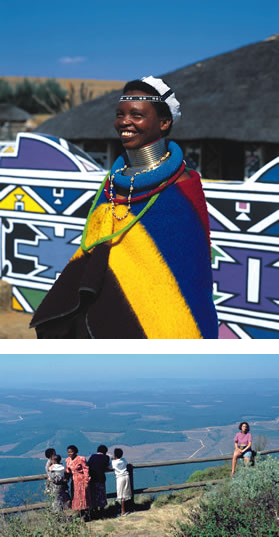
They gain basic knowledge of how the criminal justice system works and how to report incidents to the police. In addition, they also learn how to provide customer care like handling complaints and giving advice.
-Samona Murugan

Cartoon strip
Cartoon strip sadminBe aware, be safe
Get there safely ... be extra careful on the roads
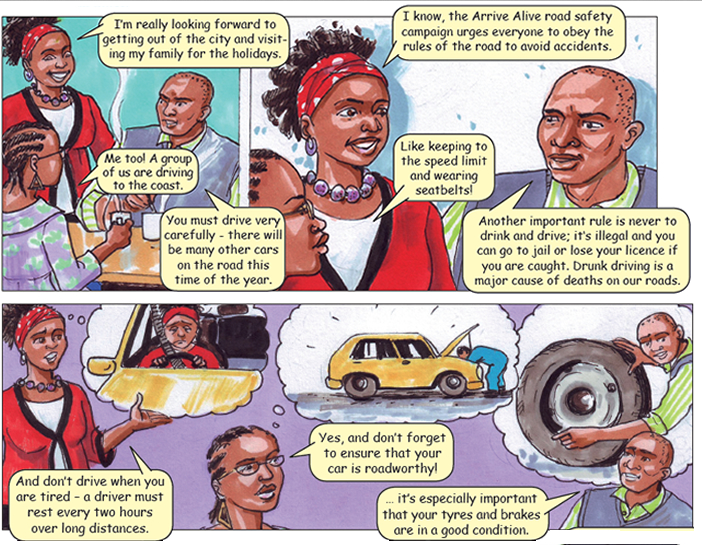
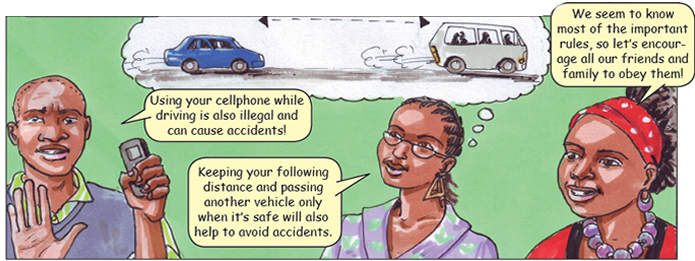
Census 2011 - Countdown to the big count
Census 2011 - Countdown to the big count sadmin
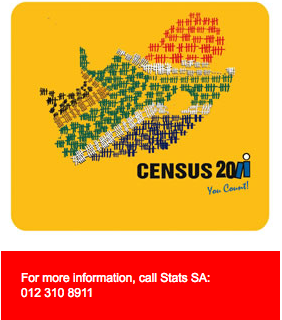
Census 2011 – the “Big Count” is the third census taking place since South Africa’s democratic elections in 1994. It will be the biggest
census ever conducted in this country.
Statistics South Africa
Statistics South Africa (Stats SA) is the official organisation tasked with carrying out the counting of people on population census days.
A population census is needed to help government with planning, decision-making, monitoring and evaluation of programmes and policies.
Information collected during population census includes the population make-up of the country in terms of race, gender, age, skills, disabilities, etc.
Fieldworkers
Using the collected information, government and the private sector
are able to plan for things like education, healthcare, housing and transport.
To be able to reach as many people as possible on the census nights, more than 120 000 enumerators (fieldworkers) will be responsible for the actual count. This will cover more than 14 million households on 9 and 10 October 2011.
After these two dates, the census will continue until 31 October 2011. During this time, Stats SA enumerators will count people at institutions such as hospitals, prisons, tertiary institutions and hotels.
Practice run
To ensure that its systems and processes will work properly on the actual nights of the census, Stats SA conducted some dress rehearsals or practice runs for the Census between 10 and 12 October this year.
The aim of the Census 2011 practice runs was to test the systems
and processes. It was done at households in the 720 chosen enumeration areas.
All information given to enumerators will be confidential – it will not be shared with other research agencies or government structures.
Questionnaires
Enumerators will use three questionnaires during the census. The main questionnaire will be used on the census nights of 9 and 10 October for households.
The other questionnaires will be for people who are visitors or tourists at hotels or people who are about to leave the country at any of the ports of entry such as airports, border posts and harbours.
The third questionnaire is for people who will be in institutions
such as patients in hospitals, prisoners (both awaiting trial and those serving sentences), as well as students at tertiary institutions.
Identification
Members of the public will be able to identify Stats SA enumerators by the 2011 yellow bib, 2011 Census yellow cap, Census 2011 yellow
bag and Census 2011 identity document.
-Mbulelo Baloyi
Focus on the provinces: Eastern Cape
Focus on the provinces: Eastern Cape sadmin

The main aims of the Road Ranger programme are to reduce road accidents and monitor stray animals through community involvement.
With South African roads always busy during the December break, the Road Rangers make an important contribution to the overall December Road Safety Plan of the Transport Department.
The programme therefore serves to promote awareness and create ownership of road safety in communities, particularly in rural areas. In addition, the rangers also guard against the theft of road fences.
Horses and bicycles
The Road Rangers use horses and bicycles to patrol major routes that have a high incidence of road accidents caused by stray animals. The routes include the R61 in the OR Tambo District, as well as the 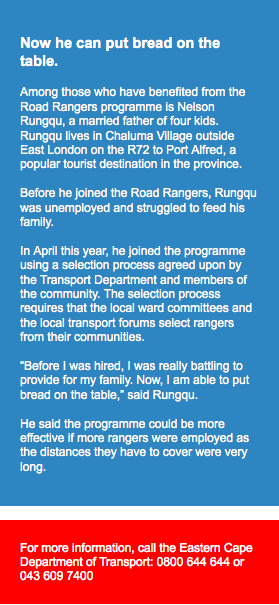 R63 and R72 in the Amathole District and many others that have high accident rates.
R63 and R72 in the Amathole District and many others that have high accident rates.
The project, which was started in late 2007 with 22 rangers, has grown to 404 rangers throughout the Eastern Cape.
EPWP
The Eastern Cape Transport Department uses this project as an Expanded Public Works Programme (EPWP) to provide short- and long-term job opportunities in rural communities.
Road rangers must have their own horse and saddle. They must be able to read and write and be physically fit and healthy. In addition, they must be familiar with the area to be patrolled and must live close to the road where there are problems of stray animals.
Allowance
Each ranger is allocated a distance of five kilometres to patrol. In addition to monitoring stray animals, their duties include repairing fences and gates along the road, communicating with provincial traffic police and helping with scholar patrols and road crossings.
They get a monthly allowance of R3 000 of which R1 000 is set aside for the maintenance of their horses. They also get binoculars, reflective protective clothing and red flags.
Other than SEDA and Volkswagen SA, the co-operative also received help from the Uitenhage Despatch Development Initiative. This is a local organisation focusing on developing SMMEs in the area
- Mbulelo Baloyi
Focus on the provinces: Free State
Focus on the provinces: Free State sadminFocus on the provinces: Free State
Fish hatchery to create jobs, develop skills

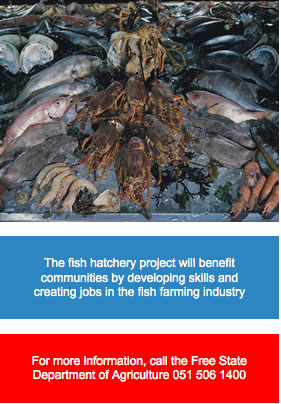
The new fish hatchery is built by the Free State Department of Agriculture in cooperation with the Chinese government. It will be known as the South African Agricultural Demonstration Centre.
The centre will start operating in February 2011 and will be used for production of different fish breeds, as well as for research, demonstrations and training purposes.
During the construction phase, the fish hatchery project has already created more than 100 employment opportunities for local people.
In addition, the Free State provincial government is working with the Chinese government in the development of fish farming among rural communities.
Training
As part of a poverty alleviation programme, local rural communities will be trained in fish farming. During the first three years, the Chinese will help with training communities, scientists, and fish farmers as part of an agreement to transfer skills to South Africans.
“This fish hatchery will be in production for more than 50 years and during this time more and more people will be trained in farming fish breeds such as catfish,“ said Free State Premier, Ace Magashule. “We hope that rural communities will form cooperatives and start fish farming projects so that they can earn a living thus beating poverty”, the Premier said.
Employment
The national Department of Agriculture, Forestry and Fisheries is helping the Free State Department of Agriculture with the development of the fish farming industry, particularly abalone which is in demand in East Asian countries such as China.
Government aims to grow the fish farming industry to produce about 90 000 tonnes of different kinds of products including abalone and cat fish. This will help to create employment in rural areas. It will lead to more and more rural communities participating in the mainstream economy through possible export opportunities.
SADC region
The fish hatchery will be the biggest in the Southern African Development Community (SADC). Its services will be used by other provinces in South Africa, as well as by SADC countries.
- Mbulelo Baloyi
Focus on the provinces: KwaZulu-Natal
Focus on the provinces: KwaZulu-Natal sadminFocus on the provinces: KwaZulu-Natal
Taking a stand against pollution

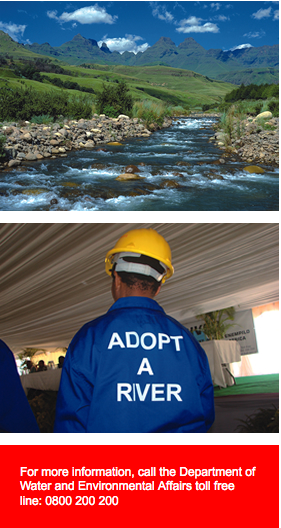
Nomvula decided to take a stand against the pollution in the Isipingo River. Together with Zodwa Elizabeth Ndlovu and a few other women from her community, they started an action plan to clean up the river.
“No one was taking a stand and doing something, so as women of the area, we decided to get together to see what we could do to involve the community in taking action,” said Nomvula.
In 2008, about 100 women got together to discuss ways to clean the river and restore it to the way it used to be.
Cleaner environment
The project became operational in February 2009. The women were driven by their desire for a better life and cleaner environment and started to clean the river themselves.
After hearing about what the women in the community had achieved, the Department of Water and Environmental Affairs officially launched the Adopt-a-River project in Durban. The project has since been rolled out in different parts of the country.
Awareness
It aims to create awareness about the need and importance of protecting water resources. So far, R1,7 million has been allocated to the Isipingo Adopt-a-River Project.
As part of the Isipingo project, the 100 women from the Umlazi area, including Nomvula and Zodwa, will continue to clean the river for a period of 12 months. “We were volunteering our services and doing it to improve our community,” said Zodwa. “It was tough when we started because we didn’t have the right equipment,” she explains.
They now have pangas and sickles to cut away the weeds or small trees that are hazardous to the environment. Wearing overalls, boots, and gloves and using black refuse bags, they also collect rubbish in the river.
Think of yourselves
The women urge communities to look after their rivers, parks and roads. They also want to tell women that they don’t have to wait for government grants, but to stand up and think for themselves.
“Go out in your communities and look at how you can help. Because of this project, we now have our own vegetable gardens and we can use water from the river.”
A similar project is running in Thohoyandou, Limpopo with women cleaning up the Luvuvhu River. The women will also get a monthly stipend and be trained on water resource management.
– Samona Murugan and BuaNews
Focus on the provinces: Limpopo - A shining rural development success
Focus on the provinces: Limpopo - A shining rural development success sadmin
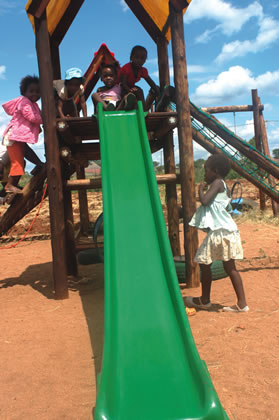
Today, Muyexe Village, neighbouring the Kruger National Park, boasts its own library, a post office, a 24-hour satellite police office and a well-equipped computer centre. A new R4,4 million multi-purpose sports centre that will cater for various sporting codes is planned for the future.
Houses
Muyexe Village also has its own community hall and 283 modern houses with electricity and water. Some 300 of the gardens are used to grow vegetables, which are sold to the local supermarket. Surplus produce is sold among the locals in the village.
In addition, the village has a fully operating clinic with four full-time professional nurses. The clinic provides primary healthcare for the community.
Common goal
The people of Muyexe owe their changed fortunes to government’s Comprehensive Rural Development Programme developed by the Department of Rural Development and Land Reform.
Other government departments are also involved and work together towards a common goal to improve the lives of rural people.
Developments in Muyexe Village is proof that the programme has already lived up to its main objectives of enabling rural people to take control of their lives with government support.
Hope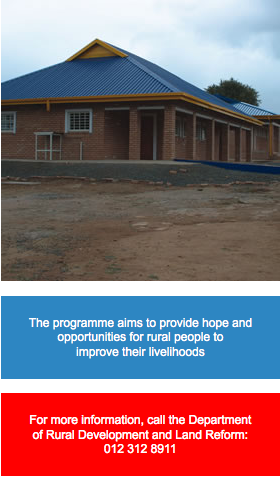
The project was launched last year in August as a pilot project in the Greater Giyani Municipality.
Its main purpose is to empower rural communities by providing hope and opportunities to improve their lives. This will discourage the ongoing movement of people from rural areas to urban areas in search of better opportunities.
At Muyexe, the local primary school and the local Hatlani High School have been renovated. In 2002, the Department of Social Development’s National Development Agency provided funding for the Muyexe Early Childhood Development Centre to build a crèche for local children.
As part of its commitment to develop skills, the National Development Agency also funded the project with more than R1 million to improve the management skills of the people in charge of the Muyexe crèche.
Training
People furthermore received training in project and financial management, bookkeeping, basic computer skills and brick making. In addition, 11 youths received scholarships to study construction programmes for a year.
Funding was also used to build a bakery, buy bakery equipment and to pay the bakery employees.
- Mbulelo Baloyi
Focus on the provinces: Western Cape
Focus on the provinces: Western Cape sadminFocus on the provinces: Western Cape
Helping to meet, basic needs

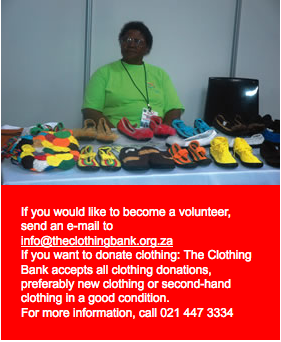
Clothing is a basic human need that many disadvantaged communities have a shortage of. In South Africa, there is an excess of clothing every year valued at between R200 to R900 million.
Donate
The Clothing Bank gets these clothes from retail stores, manufacturers, wholesalers and the general public who don’t need them anymore. They are then sent to the warehouse in Cape Town, repaired and de-branded. This means all the brand-named labels are taken off.
The clothes are then sorted into different groupings to ensure that they are right for the different organisations that need them. They are then sent to non-profit organisations, welfare institutions and government services who identify the needs of communities. Clothes are also stored and used for disaster relief.
Unemployed women from poor communities, mostly single mothers, are increasingly at risk of being abused and deprived if they don’t have the chance to improve their skills and become economically self-sufficient.
To help empower unemployed women, a lot of the clothing collected for the Clothing Bank is therefore used in the Enterprise Development Programme. It is a 12-month programme that benefits unemployed, single women who are selected to participate.
Training
To qualify for this programme the women have to be South African citizens, unemployed, mothers and single. Once selected, the women receive training for a total period of about 100 hours. Topics include personal financial literacy, enterprise development, life skills and industry-specific training.
The women then receive clothing every month at a discount price. They sell it in their communities for profit, which helps them to support their families and become financially self-sufficient.
As part of the programme, they must also work in the factory part time for a certain number of hours per month. This helps them to develop their skills by gaining work experience.
Jobs
After taking part in the Enterprise Development Programme for eight months, the women are assessed on their strengths and weaknesses. This serves to determine whether they are best suited to become self-employed or whether they should be assisted to find jobs in the formal sector.
– Samona Murugan
Fun page
Fun page sadminFun page
Be safe on the roads...
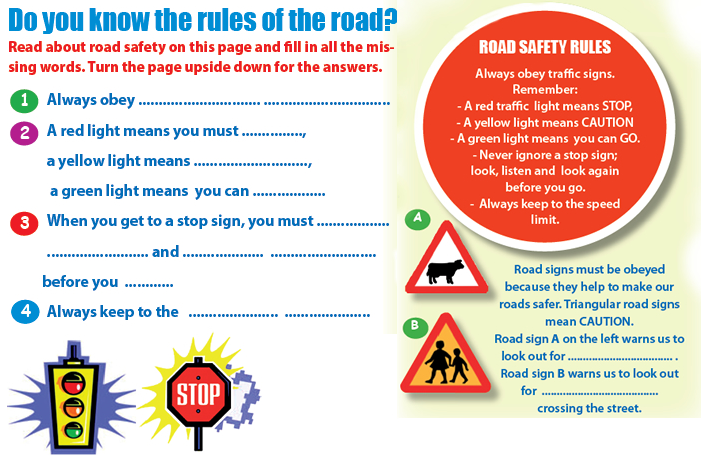
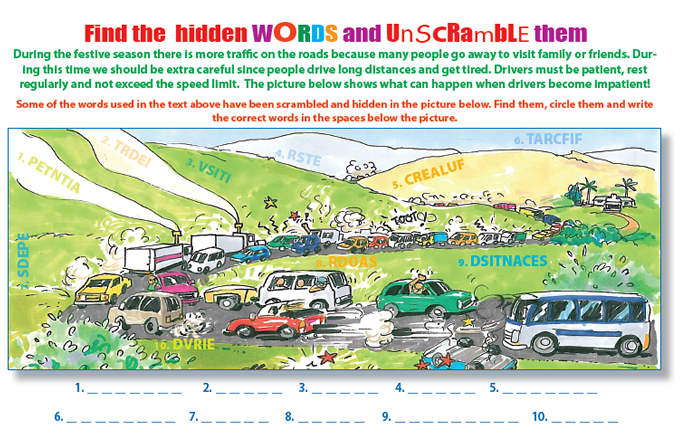
Higher education - Post-school skills development: making people more employable
Higher education - Post-school skills development: making people more employable sadmin
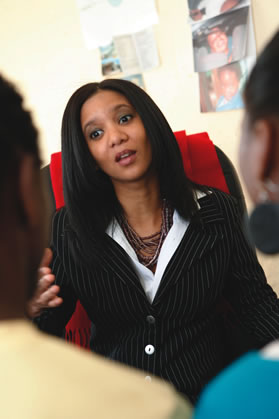
The overall aim of the post-school skills development plan is to improve the skills of people entering the job market or those who are employed but need to improve their skills.
The plan will see the creation of a trustworthy body for skills planning. This will help youth and adults who do not meet entry requirements for post-school programmes to get access to further studies. It will also help to improve access to on-the-job training programmes with special focus on artisan training.
Quality skills
Government is aware of the need to develop skills and to also ensure that the skills are of a high quality to meet the needs of employers. It therefore started the Quality Council for Trades and Occupations.
The body is responsible for developing occupational qualifications and ensuring that it meets high standards. This will be done by using all the institutions that fall under the Department of Higher Education and Training. These include universities, universities of technology, colleges and the Sector Education and Training Authorities (SETAs). A National Artisan Moderating Body will ensure the production of quality artisans and also remove problems around efficient and quality trade tests.
Both these bodies will play an important role in helping to ensure that the public will have more confidence in the quality of skills development and training.
Confidence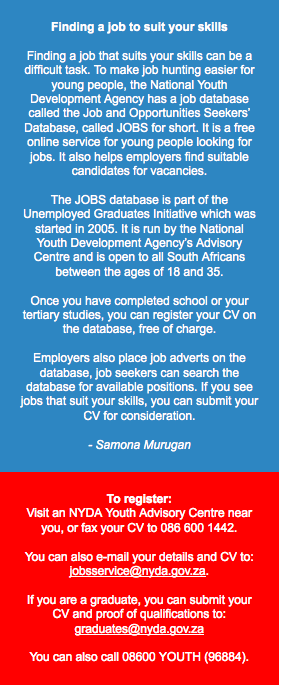
The Department is presently taking steps to strengthen the INDLELA trade-testing centre to ensure that more artisans meet the high standards required by employers in the industry.

Keeping it brief
Keeping it brief sadmin
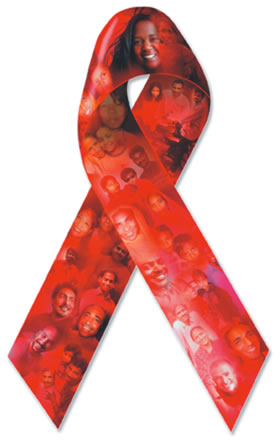
On 1 December this year, government joined the rest of the world to mark Worlds Aids Day 2010. The theme of the World Health Organisation’s (WHO) campaign for this year’s World Aids Day was Light for Rights. It focused on keeping the light on HIV and human rights. People and organisations all over the world were asked to make their lights bright in their homes and buildings to remember those affected by Aids. In addition, people and organisations were asked to turn on the lights to highlight the basic rights that are shared by all people.
In South Africa, government has allocatd an extra R100 million to the Department of Health to help fight HIV and Aids. The department and the nine provincial health departments, is stepping up its HIV Counselling and Testing (HCT) campaign as part of the overall plan to fight HIV and Aids. President Jacob Zuma launched the HCT campaign earlier this year with the aim of reaching nearly one in three South Africans – 15 million people – by June next year. Through the HCT campaign, Government offers free HIV testing at public clinics, and at discount pharmacies using governmentsupplied testing kits
- Mbulelo Baloyi

KwaZulu-Natal
The province’s HIV Counselling and Testing (HCT) campaign is well on track towards achieving its target, with a total of 710 650 people having been tested for HIV in the province. As part of the campaign, 500 nurses are undergoing university training on Nurse Initiated Management of ART (NIMART). This will see at least 80 per cent of primary health care clinics in KZN offering ART by the end of the financial year.
Eastern Cape
Eastern Cape learners who excel academically and show potential for further studies, can apply for one of 42 transport bursaries. Those who wish to apply must meet the admission requirements of the different tertiary institutions. Application forms are available at the Human Resource Development Offices of the Department of Transport in King Williams Town, as well as in the six district offices in Port Elizabeth, Aliwal North, Queenstown, Mthatha, Kokstad and East London.
Limpopo
The Limpopo Department of Agriculture has embarked on a campaign to encourage all its illiterate employees, most of whom are general workers such cleaners, gardeners and tea-makers, to learn how to read. This year, 34 people have received their level 4 certificates. Most of them are general workers and, if they could further their studies at an FET college, it would enable them to apply for various vacancies available in government, as well as the private sector.
North West
The community of Magogong near Taung in the province started its own website. This follows a partnership between the Department of Local Government and Traditional Affairs, Greater Taung local municipality and the Government Communication and Information System (GCIS). The website: www.magogong.com will strengthen communication between government and communities and keep the local community informed about the municipality’s community programmes .
Free State
The province’s farming community is to receive muchneeded relief after severe damage from veld fires. More than 410 000 hectares of farm land in the province has been burned down since June. The provincial government has made available R5 million for this purpose. Ventersburg farmers have already received fire fighting equipment and information on how to handle hazardous situations.
Mpumalanga
A group of newly trained supply chain and asset management practitioners from municipalities and government departments in Mpumalanga has been encouraged to become champions of the poor by delivering better services. Receiving their official training certificates from the Department of Finance on Thursday in Mbombela, MEC Pinky Phosa said graduates were expected to fasttrack service delivery in their constituencies and resist the temptation of corruption.
- Information sourced from BuaNews and provincial government websites
For more information, call 1020
Letters
Letters sadmin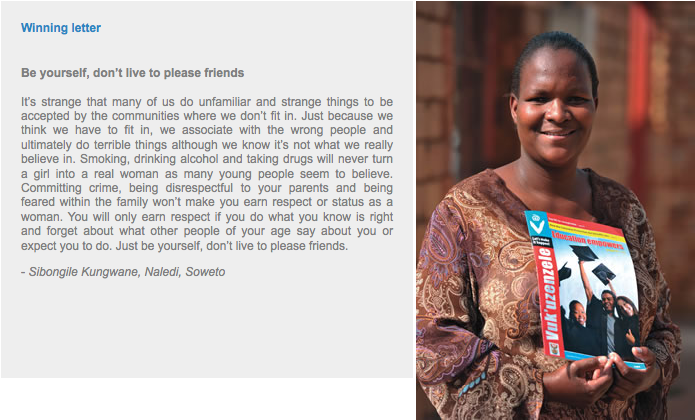
Proud to be myself
I am 23 years old and lost one of my legs as a result of cancer. When I was ill I was sure that my dreams were buried, but now I know being disabled is not a dead end. I am working at Lekwa-Teemane disability centre with other disabled people. I‘m so proud to be myself and to walk with my two silver sticks. These sticks are my friends, they are magic and they help me around. I treat them with respect, they are my life.
– Khutsafalo Lydia Kgwele, Utlwanang, North West
Arm yourself with skills
The idea of a woman getting married to be supported by a man is finally gone. Women need to start looking after themselves, plan ahead, start a small business, be their own employers, and most of all arm themselves with education and skills. Unemployed mothers can attend ABET and then study by corresponding with colleges. Nobody can take your education; you have it for life. “Wafundisa umfazi, wafundisa isizwe” - you teach a woman, you teach the nation.
– Nomsa Makhaza, Rustenburg, North West
What the doctor ordered
The article “Her Positive Attitude Beat Disability” (Vuk’uzenzele July/August 2010) is just what the doctor ordered. I’ve always wanted to learn Sign Language to communicate with people with hearing disability. The Sign Language finger spelling alphabet you published will serve as my starting point to taking more lessons. Sign Language should have been enshrined when our official languages were chosen. More people whose work is to serve the people must at least know the basic Sign Language. In many companies the talented people with hearing disability are ignored simply because the authorities can’t speak Sign Language. We must all realise that being deaf is not a handicap.
– Ephenia Moffat, Ga-Rankuwa, Gauteng
Real men don’t rape
AIDS moves freely among us because of casual sex and rape. But a man who knows and respects himself has respect for life; he does not rape or have casual sex. A real man does not prove his manhood by forcing a girl to have sex with him. A real man is responsible, mature and considerate. He thinks before he acts. This message is also meant for ladies. Avoid risky situations like walking home alone at night. A woman who values her life does not put herself in danger. Stop inviting AIDS!
– Gomotsegang Mothibedi, Marokwaneng, North West
Learning is a privilege
Look at learning as an opportunity and a privilege rather than as a struggle. Today, most people think of education as a university degree, but there are many technically oriented courses such as nursing, fashion design, jewellery design and hotel training that give us the qualifications to do particular work. But no matter what your goals are, learning to use a computer and the Internet is essential for everyone.
– Richard Sello Chacha, Ottosdal, North West
Knowledge is power
Don’t be afraid to reach out to something new even if you get negative results - remember that knowledge is power. Never quit, tighten your shoes, button your jackets and walk proudly in front of those who look down on you because tomorrow they won’t find you there. Stop blaming others for your mistakes, keep travelling through that gravel road even if it is stony, you’ll eventually reach your destiny, it is just around the corner.
– Ramoroka Chuene Salome, Ga-Mushi, Steiloop, Limpopo
The doors of learning are wide open
It is depressing to realize that many South African citizens are still illiterate in this period of freedom. The doors of learning are wide open - there’s free and basic education for children and adults. There are learning centres out there and bursaries, scholarships and learnerships are available. You need a strong burning desire for your future to achieve good things in life. Time waits for no one; to go forward, you need a proper basic education.
– Choma CA, Ga-Mashaville, Limpopo
Have faith in your child
Our parents should try to support our dreams, not to live their lives through us as their children. We have our own dreams which we want to achieve, but how are we suppose to do that when our parents are against our dreams. It hurts children to know that they do not have their parent’s support in achieving their dreams. Our parents also had dreams and tried to achieve them. We love and respect our parents, but we beg them to have faith in us.
– Emmah Ditshego, Brakpan, Gauteng
It’s the police’s duty
Two young boys were allegedly assaulted and beaten after members of the community accused them of stealing. The 15-year old was discharged from hospital, while his 17-year old friend remained in a bad condition. A resident heard that the boys had stolen his goods. To claim justice, he reported them to the police to be charged for crime. Instead, the man was charged for attempted murder. Taking the law into your own hands can get you arrested. It’s the police’s duty to apprehend the criminals.
– Ismail Foster, Newlands West, Durban

Local government - Helping municipalities to reach service goals
Local government - Helping municipalities to reach service goals sadmin
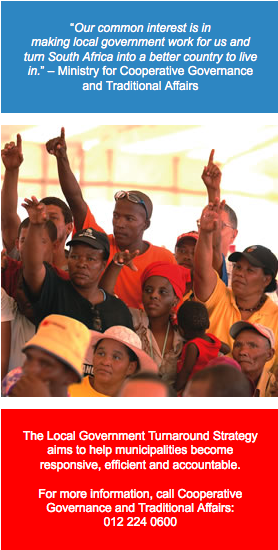
Government’s turnaround plan to address service delivery problems is known as the Local Government Turnaround Strategy. The plan is run by the Department of Cooperative Governance and Traditional Affairs. Its main aim is to help municipalities bring much-needed services to their residents and to respond faster to complaints from residents. The plan also aims to restore the confidence of the majority of people in their municipalities.
At the end of September, the Minister of Cooperative Governance and Traditional Affairs, Sicelo Shiceka, signed a service delivery agreement to show his commitment towards carrying out the plan.
Objectives
The turnaround plan has five main objectives. They are to:
- ensure that municipalities meet the basic needs of commnities
- build clean, responsive and accountable local government
- improve functionality, performance and professionalism in municipalities
- improve national and provincial policy, support and supervision of local government
- strengthen partnerships between local government, communities and civil society.
As part of efforts to make sure that all communities understand and support the turnaround plan, government translated it into all official languages. This also makes it more accessible to everyone who is responsible for putting the plan into practice.
Four phases
The plan is rolled in four phases. It started in January this year and will end in March 2011.
Phase 1 included provincial support teams visiting municipalities between January and February. They identified at least two municipalities in each province that needed the most urgent help from central government.
This was followed by Phase 2. It included the roll-out of turn-around plans at individual municipalities where there were urgent problems. The department also completed turnaround plans for all the other 283 municipalities in the country.
During August and September this year, all municipalities held ward meetings in every ward to find out which urgent needs had to be addressed in their wards.
Rate payers
As part of the turnaround plan, government will continue to engage on a local level with those rate payers who have stopped paying rates and services as a form of protest against poor service delivery. In addition, government is also planning a national engagement platform with rate payers.
- Mbulelo Baloyi
Presidential Hotline - Keeping government in touch with the people
Presidential Hotline - Keeping government in touch with the people sadmin
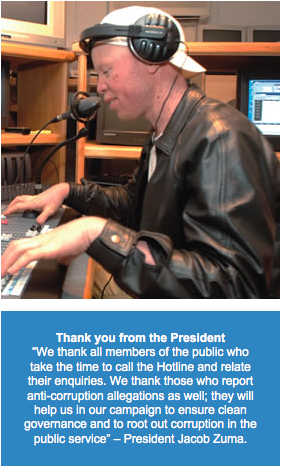
President Zuma has promised that his administration would do things differently and faster. The Presidential Hotline is one of the things he initiated to promote a government that is accessible, cares about its people and responds to complaints and queries from the public.
Main complaints
The main complaints received from the public relate to housing, employment, safety and security, water, electricity, citizenship issues such as access to identity documents and birth certificates, social grants, education and training, roads construction and maintenance, as well as health services.
Electricity bill
Many people have been helped through the Hotline. One such caller is Johannesburg resident and businesswoman Ms Jenene Beukes. Beukes could not believe her eyes when her business electricity bill showed she owed City Power a R100 000 for two months’ electricity. Beukes realised that it was too high for two months and knew she could not afford to pay it. She repeatedly phoned City Power head office, but there was no reply from any of the numbers listed on her electricity bill.
Fearing that her electricity would be cut off, she phoned the Presidential Hotline and explained her problem. They found that her electricity account had been overcharged with R60 000. Beukes is happy to report that City Power later found the problem and subtracted the overcharged amount.
Compensation payment
A widow from Malimong outside Grobersdal in Limpopo had problems getting her late husband’s compensation payment from the Department of Labour.
Ms Mahlodi Maila’s husband died on duty in March 2007. She submitted a claim, but the Compensation Commission did not approve the claim.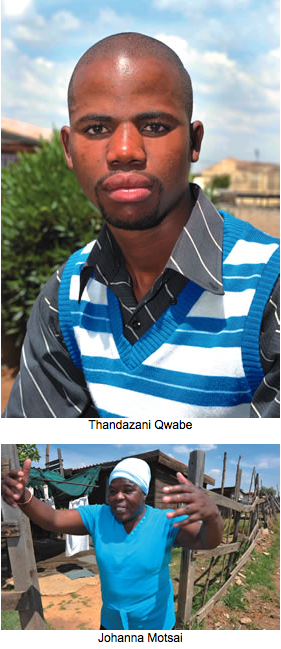
Maila was worried as the three-year period to file a claim was about to expire. Her brother, George Madiseng, then called the Presidential Hotline for help. In July this year, the Compensation Fund paid expenses for the funeral and other additional payments, as well as a monthly pension. Maila is now happy thanks to the Hotline staff.
ID document
A young KwaZulu-Natal man had almost given up on getting his identity document. Twenty-two-year old Thandazani Qwabe of Ladysmith first applied for his ID book in 2006 when he was in matric. When he went to collect the ID at the local Ladysmith Home Affairs office, officials said he had to re-apply for a new one. He re-applied in 2007.
When he went to collect his ID, he was told to check at the Dundee office of Home Affairs. His ID was not at the Dundee office and he was again told to re-apply or check at the Pomeroy office of Home Affairs.
He then decided to contact the Presidential Hotline for help. They arranged for Qwabe to apply for late registration of birth at the Alexandra office of Home Affairs and he finally got his ID in February this year.

Crime hotspot
Another caller, Ms Johanna Motsai of Phomolong in Tembisa, Gauteng complained about a crime hotspot near her home.
Motsai was worried about continuing incidents of theft of equipment
that had been installed by the municipality to prevent flooding when it rained. Hotline staff advised her to speak to her local councillor, but the incidents of theft continued.
Hotline staff then arranged a meeting between Motsai and the Rabie Ridge police station commander. Police increased their visibility by patrolling the crime hotspot. Motsai reports that since then, there has been no incidents of theft.
She found her child
Lindiwe Hlatshwayo from Watville, Benoni asked the Presidential Hotline to help her make contact with her child Nkululeko. The child had been taken away from her by social workers because he was sick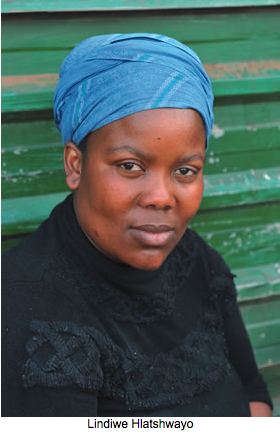 and placed at a children’s home to receive care and treatment.
and placed at a children’s home to receive care and treatment.
Before the child was placed in the children’s home, he had been admitted at the OR Tambo Hospital for treatment. On discharge from the hospital, social workers told Hlatshwayo to hand over her child to them as she could not take care of him because she was too poor.
Hlatshwayo lodged a complaint at the Germiston offices of the Department of Social Welfare, but did not get any help from them. She then phoned the Hotline. As a result of their intervention, she is now allowed to visit her child and to spend two hours with him every second Saturday at the children’s home.
- Mbulelo Baloyi
Role models
Role models sadmin
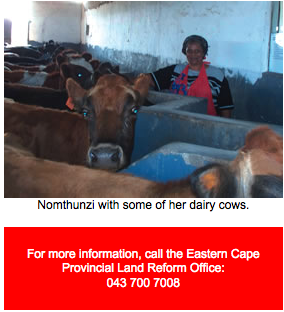
Former nursing sister Nomthunzi Nduzulwana refused to surrender to natural risks such as drought. It is this undying spirit of no surrender that has seen her dairy, High Heaven Farm, at Thorn Park just outside East London continuing to survive amid the crippling drought that has plagued the Eastern Cape during the last three years.
Pigs and chickens
Apart from dairy farming, Nomthunzi also runs a piggery and a chicken broiler farm, which supplies more than 200 000 broilers every six weeks to a local poultry processing company, ANCA. Sixty large sows and three boars have also helped Nomthunzi to constantly supply quality pork to a local abattoir.
She also has an in-house chicken abattoir where meat is processed. Smoked chicken, viennas and processed chicken meat for the catering industry, as well as chicken sausages are among the products produced on the farm.
Milk and vegetables
On the dairy side, 70 cows supply milk to a local dairy products processing company.
Because of drought Nomthunzi can’t explore other areas of farming such as cattle farming or vegetable production. But she has applied for a loan from a local provincial development finance organisation to put in more boreholes, which will help her restart vegetable production.
Hooked on farming
Nomthunzi has been interested in farming since childhood. “My father was a church minister and we stayed in a mission where there was a lot of subsistence farming by the locals on the mission land. We used to help the farmers and that’s how I got hooked on farming,” she says.
While she was nursing at Berlin, she bought a piece of land and started a small-scale vegetable production business. The business grew and became successful, but the land was too small for further growth.
In September 2008, she heard that there were farms on sale in the East London area and made enquiries. “I approached the then Land Affairs Department, now known as Rural Development and Land Reform, for assistance. They bought the farm under the scheme known as the Pro-active Land Acquisition Scheme (PLAS).”
Employees
There are now 50 employees, including young people, at High Heaven Farm – 12 men and 38 women. Of these, 30 are employed on a permanent basis and the remaining 20 on a seasonal basis. Nomthunzi’s sister, brother and five children help her to manage the business.
- Mbulelo Baloyi
Save the environment
Save the environment sadminLive green: Act now! Spread the word at work, home, school and help save our living planet!!!

Greening tips
- Keep your kettle energy friendly
When using a kettle, only boil as much water as you need. It will save electricity and the water will boil faster. - Switch off
Turn off lights when you don’t need them – it saves energy … and reduces your electricity bill! - Use energy saving bulbs
Replace light bulbs with compact fluorescent bulbs – they can save up to 80% on your next electricity bill and last up to eight times longer. - Recycle
Recycle everything you can’t reduce or reuse. - Save paper
People worldwide use 1 million tonnes of paper every day. This puts huge pressure on the environment. - Enjoy the sun
Turn your home into a clean power station by fitting solar panels on the roof of your house. - Turn it off
Do not let the water run while shaving, brushing teeth or washing vegetables. Reuse water from washing vegetables to water house plants. - Fix dripping taps
A tap dripping 45 times per minute wastes around 1 000 litres of water a month, the equivalent of 10 baths per year. Fix leaking taps and make sure they are fully turned off. - Hang it out to dry
Electric clothes dryers are energy intensive, so if possible, dry your clothes on a clothes line outside in the sun. If this is not an option, drying through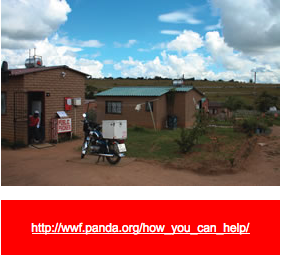 spinning is 20 times less energy intensive than with heat.
spinning is 20 times less energy intensive than with heat.

What is climate change?
What is climate change? sadmin
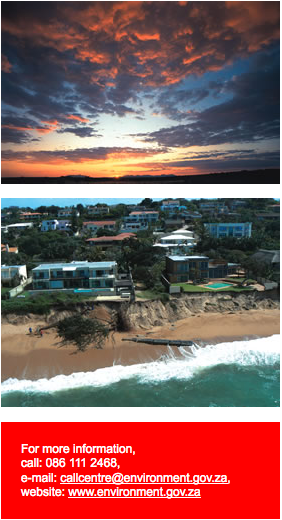
Which human activities contribute to climate change?
Climate change is caused by an increase in greenhouse gases like carbon dioxide, methane and nitrous oxide due to human activities.
Scientific reports show that the rapid increase in greenhouse gases is linked to the increase in industrial activities and population growth.
Natural events can also cause changes in climate, for example volcanic eruptions which put small particles in the atmosphere. But these events only take place from time to time and not continously like greenhouse gas emissions from human activities.
Carbon dioxide emissions result from the burning of coal, oil, natural gases (fossil fuels) for producing energy that is used for transportation (for example, cars) and to generate electricity.
Clearing land for housing and agricultural purposes by removing plants, also leads to an increase in carbon dioxide in the atmosphere.
Methane is generated during coal mining and in landfills and open dumps when organic waste decomposes. Nitrous oxide is produced by various industrial and agricultural activities like livestock production.
Impacts of climate change
The impact of climate change affects the way we live, for example:
- our ability to grow food
- our water supply
- our health
- plants and animals around us
- economic conditions of families and communities.
Rising temperatures cause:
- a rise in sea level
- change in rainfall patterns
- an increase in severe weather conditions such as floods and heat waves.
What is government doing?
Government, through several national departments, has committed itself to participate in the various international climate change agreements.
These agreements include the United Nations Framework Convention on Climate Change (UNFCCC). South Africa will host the UNFCCC COP 17 in 2011.
The Department of Environmental Affairs is currently driving the climate change policy development process. Various provinces and national departments are drafting their own, more detailed, climate change response strategies.
South Africa’s National Climate Change Committee (NCCC) is a multi-stakeholder forum that informs government on various climate change policies and measures.
What can we do to combat climate change?
- save energy in your home, at school and at work
- cut down fuel consumption
- plant trees
- limit the dumping of unwanted materials – recycle glass, tins and plastic items
- make compost from organic materials and use it in your garden
- become involved and spread the word about climate change and its negative effects to your family, friends and community.

Youth - Uniting to shape the world
Youth - Uniting to shape the world sadminYouth
Uniting to shape the world

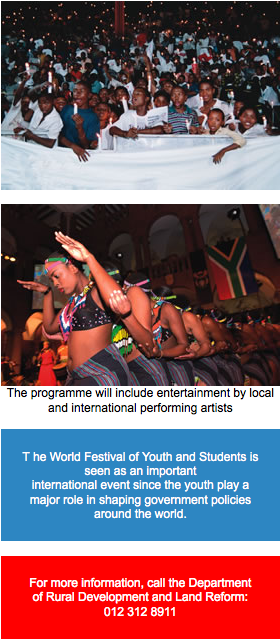
The World Festival of Youth and Students is the largest international youth gathering in the world. It takes place every four years in a different country and aims to unite the youth of the world for peace, solidarity and social transformation. It also seeks to create a world free of human rights abuses.
The opening and closing ceremonies of the festival will be held on 13 and 21 December respectively at Orlando Stadium in Soweto.
The festival is organised with the support of the World Federation for Democratic Youth (WFDY), which has members from 153 countries. Most of the past presidents and officials of this organisation are now leaders of government and industry in their respective countries.
NYDA
South Africa’s National Youth Development Agency (NYDA) won the rights to host this event in South Africa through a bidding process. Countries were invited to make presentations in a process similar to that of the FIFA World Cup.
This year’s event is expected to attract 30 000 delegates from the 153 member countries of WFDY, as well as presidents and ministers from various countries.
Challenges
Delegates will look at youth development and different challenges facing today’s young people, including social, political and economic issues. It will look at ways to reduce unemployment among youth and to advance youth development through guidance and support from different sectors of society and government.
Legacy
As the host country for this event, it will also be an opportunity for South Africa to build on the spirit and legacy of the 2010 FIFA World Cup. It is a chance to continue to show the world that we are great hosts. It will promote our country as a tourist destination and continue to raise awareness internationally.
Entertainment
Arts, culture and sport activities will be presented daily at Mary Fitzgerald Square in central Johannesburg. This program will include concerts featuring local and international performing artists from all the regions represented by WFDY. It will include an international poetry and song contest, a young filmmaker’s meeting, a soccer tournament with the message “scoring for friendship, solidarity and social transformation” and a marathon with the message “running for friendship, solidarity and social transformation”.
Delegates will also participate in a march to Constitution Hill and explore themes of justice with a week-long “mock court.”
- Samona Murugan